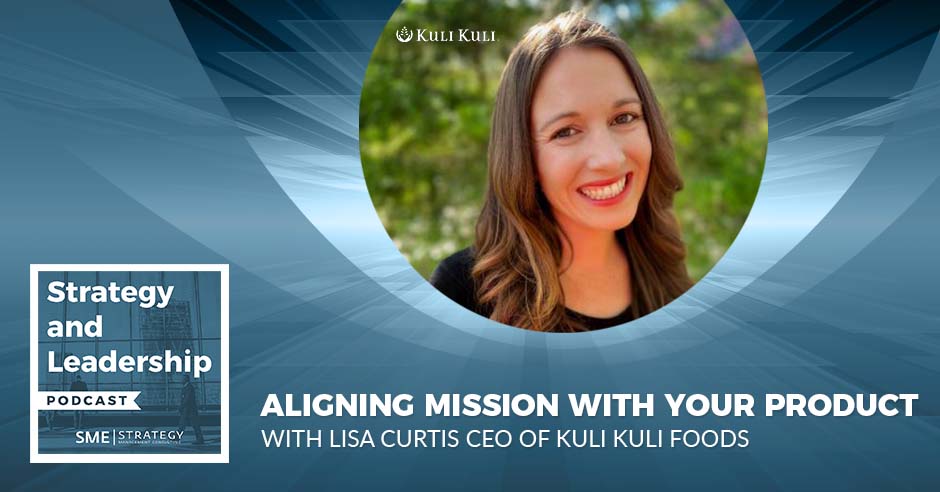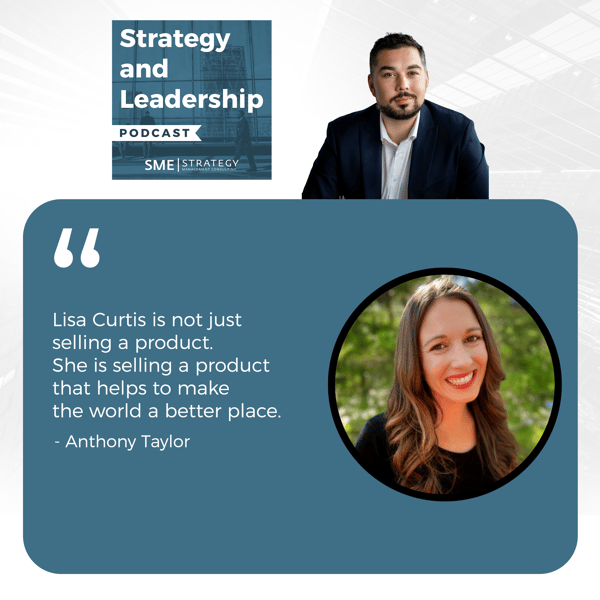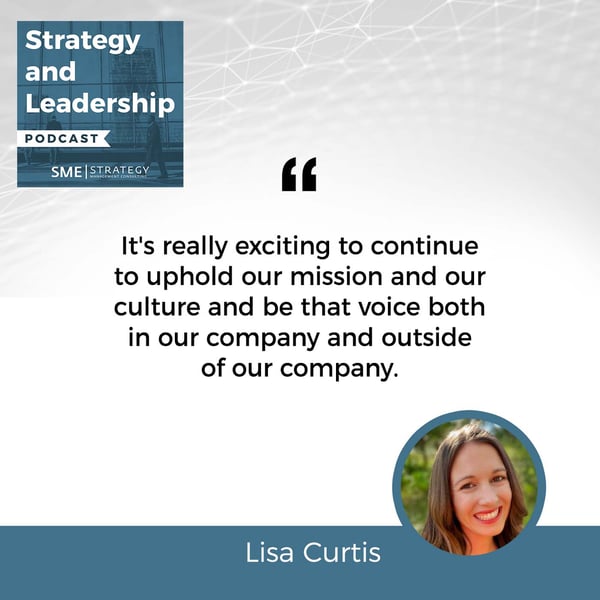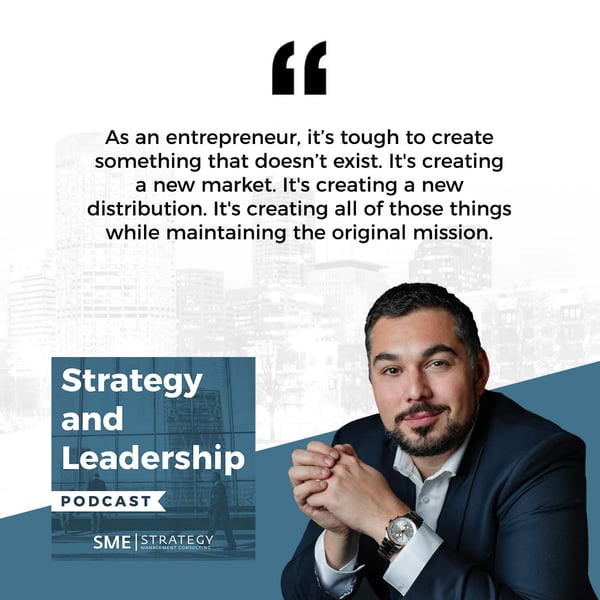Aligning Mission With Your Product - With Lisa Curtis CEO Of Kuli Kuli Foods

Success isn't just about products on shelves; it's about aligning purpose with every purchase, empowering communities, and shaping a healthier world. Align your mission with your product as Lisa Curtis, the CEO of Kuli Kuli Foods, joins Anthony Taylor in this illuminating episode. Lisa shares the remarkable story behind her mission-driven approach to revolutionizing the superfood industry. From the inception sparked by her personal encounter with Moringa in a Nigerian village to scaling up and stocking products in 11,000 stores nationwide, discover the resilient and innovative path Kuli Kuli Foods has traversed. Gain insights into driving sales dynamics, fostering innovation, and the responsibility of being a female founder in today's entrepreneurial landscape. This episode is a testament to the power of aligning business with a global mission, offering an inspiring narrative on creating purpose-driven enterprises for a healthier, more sustainable world.
Listen on Spotify: https://open.spotify.com/episode/61gHgHFVGVfl0SVzdXnwoc?si=f56b6713d6bd4902
Listen on Apple Podcasts: https://podcasts.apple.com/ca/podcast/aligning-mission-with-your-product-with-lisa-curtis/id1202449526?i=1000642083120
Want to continue the conversation with other leaders around the world? Join our Strategy and Leadership community.-
https://strategy-and-leadership.mn.co
► Subscribe to our channel for weekly videos on strategy & leadership: https://www.youtube.com/channel/UCOHLNRrpk3rGUdg7qUQjiog/?sub_confirmation=1
➡️ Looking for a sample agenda for your strategic planning offsite? https://www.smestrategy.net/blog/sample-strategic-planning-agenda
// Connect with us:
► Contact us: https://www.smestrategy.net/contact
► Connect with Anthony on LinkedIn: https://www.linkedin.com/in/anthonyctaylor604
// About SME STRATEGY CONSULTING:
SME Strategy is a management consulting firm that specializes in helping organizations develop and implement their strategic plans. We work with teams to facilitate conversations about strategic direction and business strategy so that our clients can focus their energy on what will move them forward faster.
► Work with us: Are you looking for someone to facilitate your strategic planning process? https://www.smestrategy.net/strategic-planning-facilitator
► Check out our Strategy & Leadership Podcast: https://open.spotify.com/show/4yND4JKofh64gcvyvcLMqW
► Check out our online course on how to successfully lead your next strategic planning process: https://courses.smestrategy.net
---
Watch the episode here
Listen to the podcast here
Aligning Mission With Your Product - With Lisa Curtis CEO Of Kuli Kuli Foods
My guest calling from California is Lisa Curtis, the Founder and CEO of Kuli Kuli Foods. Lisa, how is it going?
I'm great. Thanks for having me on the show.
I'm excited to share your story. Why don't you tell our audiences a little bit about what you've done and how you got to where you are? I'll get you into some questions.
I started my company Kuli Kuli Foods years ago after working with this amazing superfood called moringa in the Peace Corps. Here's a short backstory. I was placed in this small village in Niger, West Africa with no electricity, no running water, and not a lot of healthy food. I found myself feeling tired off a diet of mostly rice. I'm vegetarian. I wasn't eating meat and didn't quite know what to eat. I was not eating very well, and I asked some women in the health center where I was working, "What can I eat that would give me more energy and the nutrition I need?"
They pulled these moringa leaves off a tree and mixed them into this popular snack called Kuli Kuli. I never heard of moringa. I never thought of eating tree leaves but I trusted these women. I was like, "If you say this will make me feel better, I'll eat it. I'll try anything." I started eating it, and it had the most profound impact on my body than anything I've tried. Moringa is packed with protein, calcium, iron, and vitamins. On the nutritional side, it's an incredible nutritional powerhouse. It's more nutritious than kale, and then it's also used medicinally all over the world. It has incredible anti-inflammatory properties.

A lot of folks, particularly in South Central America, use it for diabetes and weight management. You find it recommended in Ayurvedic medicine. It's the national vegetable of the Philippines. It's a cool plant. I was like, "Why is it that I had never heard of this plant? Why is it that I couldn't find it in the US?" My first question to these farmers was, "What can I do to help you all grow more and use more of it here in Niger?" The thing that they said to me is, "We're not going to grow a crop that we can't sell. Why don't you help us sell it? We will grow more. We will use more and we will all benefit."
I had no idea what I was signing up for. I had never started a food company before. I had never even worked at a food company before but I was like, "No problem. I'll help you," thinking this would be a short-term project. A decade later, I'm still doing it. Kuli Kuli sells moringa and other superfood products all sustainably sourced directly from small farmers. We then sell them in the form of powders and gummies. You can find us in 11,000 stores across the US. We're everywhere from Whole Foods to Walmart to Sprouts and many other natural food stores in between.
How big has the company grown from somebody who's eating trees off a plant? How many employees do you have across the US or the world?
We have a lot of folks who are not full-time employees. In the US, there are about 10 folks but internationally, we have about 3,000 farmers who we're directly working with and supporting, and then we have all of our manufacturing partners, which is another couple of hundred folks as well.
To be able to supply that many stores is pretty impressive, significant, and impactful. What is cool is the work that you're doing is not just supporting your local supply chain because it's easy to look at it like that. I like how you reframed it to say, "There are 3,000 farmers, their families, and their communities. They're supported through this work."
That's one of the reasons I wanted to chat. Take me back. Years ago, you said, "I'll help you sell stuff," and now you're in all of these significant stores across the US. What was that journey like? To ask you a more specific question, what was the first leap from, "I'm going to do this short-term project," to, "I'm going to find a co-founder or what have you and then start this business."
It was an interesting leap. It involved a terrorist attack in the sense that I was initially planning to work in Niger to serve my full Peace Corps service in Niger, helping them grow more moringa, and then we were going to sell it in a local city. There was a terrorist attack in Niger, and they evacuated the entire Peace Corps home early. I was back living at my parents' house, pretty unhappy about it. I didn't have a job. This had been my plan for two and a half years. I said, " I can't help them sell it locally but maybe I can help them sell it in the US."
Coming back from the Peace Corps, I was making $20 a month. I had very little savings. I got a day job at a tech startup. On nights and weekends, I was trying to put together a business plan and figure out what that would look like, and then I pulled in one of my childhood best friends who had a lot of experience in startups and then another childhood best friend who had a lot of experience in food and new product development. We started meeting nights and weekends and figuring out, "How do we get this idea off the ground?"
How did it go from there? Did you keep selling and growing? What are some of those lessons that you learned along the way from $20 a month to this?
We were big on, "Let's take baby steps." A lot of times, if you have this big world-changing idea, it's hard to understand, "What's the first step? After that, what's the next step? How do we get these tiny steps that eventually add up to this vision that we want to create?" For us, it was, "Will people buy moringa? If so, why?" We first needed to figure out, "How do we import a small amount of moringa from West Africa? Let's test it at farmer's markets, make it a bunch of different products, and see what people will buy."
We tried to make that original Kuli Kuli snack that I had first envisioned and didn't quite work but the name stayed. We ended up launching with a moringa bar. We then tested out messaging and got a lot of interesting insights about what resonated and what didn't resonate. With me being this bleeding-heart Peace Corps volunteer, I was like, "Everyone will care that it's sourced from women farmers. It's helping to plant trees. It's good for the world."
You would have these people who would come up and be like, "My uncle did Peace Corps," talk to me for twenty minutes, walk away, and not buy anything because I wasn't pitching the product. I was pitching this story and this non-profit vision. We switched, and we were like, "This is more nutritious than kale. You're getting a full cup of leafy greens in every bar with simple ingredients to give you energy." We started to see the sales move.
It was valuable to have a very small budget to test and learn, and we changed things at every farmer's market. I'm envious. We're at a scale where we produce 100,000 units at a time. It's hard for us to go small, test and learn, and iterate in the same way. That's one of my biggest pieces of advice to folks starting. Everybody wants to be big but there are benefits to being small. Make sure you maximize. You're testing and learning while you're still small.
Everybody wants to be really big but there are benefits to being small. Make sure you maximize testing and learning while you’re still small.
How do you maintain that culture within your team? You may be able to sell more. I don't know what the market is but focusing on presumably quality and maintaining the integrity of the core product sounds like something important to you while also making sure that you're able to deliver your mission sustainably. What do those conversations look like inside your boardroom to help make sure people are focused on the right things?
It's first and foremost about hiring the right people. We're focused on people who have the relevant skillset and have spent time working in logistics, operations, or sales but also resonate with the mission. Part of the reason they want to work at Kuli Kuli specifically is because they don't want to sell a product. They want to sell a product that helps to make the world a better place. It's having people on our team and our partners be all instilled, "This is why we're here. This is why we're doing what we're doing."
Maintaining a tight culture within your team is really, first and foremost, about hiring the right people.
It's about making sure that we set the guidelines, "What type of suppliers will we source from? What types of suppliers won't we source from? Are we going to directly source every single ingredient?" In our gummies, we have to use a small amount of cane sugar. It's not worth us getting involved in the cane sugar supply because there's not a lot we can do there as a small company but it's worth us getting involved in the moringa supply, the baobab supply, hibiscus, and different ingredients where we can make a true impact on the ground. In my mind, it's about prioritization and setting clear expectations and boundaries.
> Are you looking to align your team and reach your goals faster? A strategic planning facilitator can help.
I love that you are able to look at making decisions through that mission lens to make sure that you're authentic to the product and making sure that you're supporting the people. If we look at your journey as a CEO, how has that been? Has it been fun, enjoyable, or stressful?
All of the above. To me, the thing that is most fun and exciting about being a CEO is there's no cookie-cutter day. Every day is different. Who knows what's going to come up? Maybe there's some fire, whether figurative, or we have even had literal fires in our supply chain and different things that the world will toss at us that I have to figure out and solve. I feel very excited to have an amazing team that we can problem-solve together on these things.
Do you have a leadership ethos that guides you through these things or a mantra that supports you? How do you view leadership? How do you view your role and position as a CEO while also recognizing that it's iterative, evolving, and continuously changing?
I'm a big believer in visionary leadership. I think of it, "Let's get the right people on the boat. Let's make sure we're all rowing in the same direction and we all know where we're headed. Let's make sure that we've got enough fuel or wind in the sails to get us there." Wind in the sails for me means making sure we've got the right funders behind us, be that both investors and debt. We've got all the things we need to push us forward.
How did that come into play when it comes to gathering these 3,000 farmers? I could imagine a White girl from California coming into West Africa and saying, "We're going to sell your product that has been part of your culture and heritage for a long time." How did you build their trust? What's it like building and maintaining that network? Is that the work you do? Is it somebody else on your team? It's a core part of the work that you do.
A big part of what we think about is what we call JEDI or Justice, Equity, Diversity, and Inclusion, "How do we partner in a win-win way with our suppliers?" First of all, it's not us going anywhere. We always work with folks who reach out to us. Sometimes people will email our customer service and say, "I'm growing moringa, and I want to chat." We will talk to them.
We worked with the Clinton Foundation, USAID, and other organizations in the nonprofit and development space, and they said, "Here's this cool moringa project or moringa enterprise. You should talk to them." We talked to them from there. We see our skillset as understanding how to unlock access to the US market and rely on our supplier partners to do what I think of as a hard part. Farming is not easy. It's growing and processing the highest-quality moringa. We do send QA people to visit our farms. We do support making sure that we're hitting those quality requirements.
As a final question, it says Justice, Equity, Diversity, and Inclusion or JEDI on your website. You brought it up. It's a hot topic but a lot of people are discussing it and looking at incorporating it. It sounds like it's part of your core values. It's attached to your mission. What would you recommend to our leaders and audiences who might be exploring or committed to incorporating Justice, Equity, Diversity, and Inclusion? What steps do you recommend for them to take to implement it successfully and with authenticity and truth?
One of the things we did a few years ago was make sure that we weren't just thinking about our supply chain but were also thinking about our internal team, what the makeup of that team looks like, and also the ways that we're including justice, equity, inclusion, and belonging. It's also key. We changed a lot of our hiring practices. Often companies will throw out, "These are all the qualifications I want." There's a lot of research that shows people who are generally White men will say, "I don't hit 100% of these qualifications but I'm going to apply anyway," versus women and people of color will often be like, "I can't apply. I don't qualify."
Making sure that we only had on there the things that we needed, and we also included a statement about diversity, is important to us. Forty percent of our team identifies as non-White. We've got a fairly diverse team, and it makes us so much stronger. You see it in sometimes the little things. Our head of operations is fluent in Spanish, and the native language of most of the people who work in manufacturing at a lot of our co-manufacturers is Spanish. His being able to go onto the factory floor, talk to folks, and very quickly work stuff out is unbelievable. It's amazing to watch.
Similarly, the person who manages our logistics is Samoan, which is not something I had known but there's a huge number of Samoans in the freight and trucking industry. She speaks that language. There are a lot of benefits to diversity and sometimes benefits you don't even know until you have a more diverse team, and you're like, "That's awesome."
There are a lot of benefits to diversity and sometimes you don't even know it until you have a more diverse team.
I don't know if you've ever seen Brooklyn Nine-Nine but there's an episode where the less qualified people or whatever weirdos get put into an escape room, and they all use their specific skills to help escape. At that point, people talk about it. You gave two practical examples of its value. You could say, "That's self-serving. You hired them because they support your supply chain," but we could have mentioned thousands of different ways where they contribute to the social and personal fabric of the business. What I know of you is it probably goes without saying, and because it's a business show, you brought up business things to show that it supports that.
I also like that you took into consideration the applicant's experience of applying, such that you lowered the barrier but not in a way that would compromise the company. You made it easier for people that you wanted to apply, which supported you getting the candidates that you truly wanted ultimately because you're not reducing the field. You're increasing the field by making it easier. I thought that was cool too.
We're constantly learning, and we have gotten better as we have grown.
My last question is this. What are you taking on now as a CEO? What is there that you are either struggling with or that's in your growth zone that you're focused on developing over the next year?
There are three things that come to mind. The top for many CEOs is sales. I am developing some pretty strong relationships with some of our key retailers like Whole Foods, Sprouts, and Walmart, and having increasingly higher-level conversations there about what they're looking for in their set and how we can design products for their customers. That's an exciting place to be. Relatedly, in innovation, we're thinking a lot, "Where is the white space? How do we build out this climate-smart superfood platform?"
We have 60% of the US market for moringa. We're the big dog there for sure but how do we do that for some other unique ingredients? How do we do that for some other cool superfoods and bring them to the US, not just as a weird superfood nobody has ever heard of but put them into blends, put them into gummies, and make them accessible to Americans so that more people can experience the benefits of these incredible superfoods and support small farmers?
Three, I'm excited to continue to uphold our mission and our culture and be that voice both within our company and outside of our company because I have a responsibility to make sure this is the best possible place to work for our team and that we're the best possible partners to our suppliers and great communicators to our investors and then also within the general industry.

I think a lot about being a female founder and being someone who's raised $11 million in venture capital. Unfortunately, as a female founder, that makes me somewhat of a unicorn. For many of our investors, we're one of a very small number of portfolio companies that are women-led and run. We need to over-communicate, and I feel even more pressure to make sure we continue to be successful.
I get that. I appreciate you sharing that because running a business is challenging for anybody and everybody with, unfortunately, the societal challenges that are in place but despite all of that, you've gone from a non-business background to building an incredible business that's gotten a lot of recognition that's got funding in BlueOcean. You're creating a market, innovating, taking it all at once, and doing it while maintaining your JEDI approach, supporting thousands of farmers across the world, and doing something cool. Hats off to you. I'm not wearing a hat but I would take it off if I was. There we go.
Thanks for having me.
You're so welcome. It was my pleasure. Lisa, thank you for being here. Thanks for sharing. I'm going to, hopefully, if it's in Canada, pick up some gummies soon. I appreciate you being here, Lisa.
‐‐‐
My guest, Lisa Curtis, is the founder and CEO of Kuli Kuli Foods. I talk to a lot of entrepreneurs. I see a lot of different businesses. It's tough when you're creating something that doesn't exist. It wasn't a matter of, "We're going to sell this product that already exists." It's creating a new market, new distribution, and all of those things and maintaining the original mission.

As you take on whatever you're taking on, whether it's a brand new enterprise or whether you're an employee in an organization, you're evolving and innovating to say, "How can we do it better to support the people and recognize that there are always ways to improve and ways we can learn?" I appreciate you reading this as a means of doing that. I appreciate that I get to share with you. Once again, thank you, Lisa, for joining me. I'll see you next time.
Important Links
About Lisa Curtis
 Lisa Curtis is the Founder & CEO of Kuli Kuli Foods, the leading brand pioneering the sustainable superfood moringa. Moringa is a protein-rich leafy green, more nutritious than kale, with anti-inflammatory benefits rivaling turmeric. Kuli Kuli’s superfood powders and snacks are sustainably sourced from African women and other small farmers around the world and sold in 11,000 U.S. stores.
Lisa Curtis is the Founder & CEO of Kuli Kuli Foods, the leading brand pioneering the sustainable superfood moringa. Moringa is a protein-rich leafy green, more nutritious than kale, with anti-inflammatory benefits rivaling turmeric. Kuli Kuli’s superfood powders and snacks are sustainably sourced from African women and other small farmers around the world and sold in 11,000 U.S. stores.
Lisa began working on Kuli Kuli while serving in the Peace Corps and has grown it into a multi-million dollar social enterprise. Prior to Kuli Kuli, Lisa served as the Communications Director at Mosaic where she managed a team of six to grow the company from zero to over $5M invested in clean energy.
Previously, Lisa wrote political briefings for President Obama in the White House, served as a United Nations Environment Programme Youth Advisor, and worked at an impact investment firm in India. Lisa has been recognized on the Forbes 30 Under 30 list and Inc Magazine’s Top 100 Female Founders list. She has been featured in numerous outlets including the New York Times, Wall Street Journal, and on MSNBC's Morning Joe. Learn more at www.kulikulifoods.com and www.lisamariecurtis.com.


